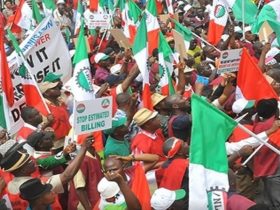The Nigeria Labour Congress (NLC) has issued a stern warning to President Bola Tinubu’s administration, giving them a seven-day ultimatum to reverse what the NLC considers “anti-poor” policies. One of the primary demands is the rollback of the increased price of Premium Motor Spirit (PMS or petrol).
The ultimatum was delivered during the Central Working Committee (CWC) meeting held on Tuesday, July 25.
NLC President, Joe Ajaero, and the union’s General Secretary, Emmanuel Ugboaja, jointly signed the communique announcing the ultimatum. They expressed strong disapproval of the government’s treatment of Nigerian workers and the general populace, particularly after President Tinubu’s speech on May 29, 2023, which declared the end of fuel subsidies. The NLC accused the government of neglecting the well-being of Nigerians and likened the treatment of citizens to that of slaves.
The labor union specifically highlighted the frustration caused by the government’s continued evasion of implementing the agreed alternatives to Premium Motor Spirit (PMS) and the recent hike in PMS prices to N617 per litre. To address these grievances, the NLC demanded an immediate reversal of all anti-poor policies, including the PMS price increase, heightened public school fees, and the release of eight months’ withheld salary for university lecturers and workers.
The NLC has set a deadline of seven days for the Federal Government to meet their demands. Failure to do so will result in the initiation of a total and indefinite strike, starting from Wednesday, August 2, 2023. In addition to the strike threat, the NLC intends to organize mass protest rallies across the country to express their outrage against the perceived “inhuman actions and policies” of the government.
As the situation unfolds, the NLC remains resolute in its mission to advocate for the welfare and rights of the Nigerian people and to hold the government accountable for policies that they believe adversely affect the poor and the working class.









Leave a Reply